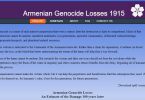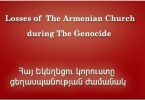Text of Tom Samuelian’s Recorded Message for the Hamazkayin Banquet
Boston, May 4, 2013
Good Morning! This is Tom Samuelian, joining you from Armenia.
Thank you for inviting me to deliver this address today. I am sorry I cannot be there in person, but I hope this message from Armenia will shed light on issues and aspirations I believe we all share.
In preparation for today’s talk, I tried to imagine the impression one would have of Armenia based on American-Armenian press coverage over the past several months. It must be bewildering.
Frankly, that impression would be very different from my first-hand experience of Armenia.
I have lived and worked full-time in Armenia for the past 15 years. The Armenia I know had a fairly calm and clean election, reelected President Serge Sargsyan, and was not on the whole impressed or swept into activism by rallies or hunger strikes.
The Armenia I know has hundreds of thousands of decent people, grandparents, parents and young adults, civil servants and private business people, who work hard, voluntarily obey the law, and try to build their lives while building the country. They teach children, serve customers, help tourists, respect citizens, cure the infirm, and protect Armenia from external threats.
The Armenia I know has a handful of very rich and powerful people and a lot of other people who are not that rich and powerful – a lot like the rest of the world, including the United States and most of Europe.
The Armenia I know is not the Armenia of expats or repats. It is not just the Armenia of Yerevan, but also of Dilijan where I spend a good part of my time. Nor is it the Armenia of partisan politics. I am a long-term resident and taxpayer of Armenia, but not a citizen or voter, at least not yet.
Is it perfect? No. Where is there perfection? In Boston? In New York? On Wall St.?
In Sandy Hook? In New Orleans? In gridlocked Washington?
True, Armenia is not perfect, but given the circumstances and resources, it is amazing things are as good as they are. And that’s largely due to the efforts of intelligent, hardworking people, who have chosen to rise to the occasion and meet the challenge of building a homeland after centuries of foreign rule, despite less than perfect conditions and despite alternatives for easier lives elsewhere.
For many of you, this is probably a different Armenia from the one you usually hear about. Critical self-awareness is of course necessary for development. But it should be awareness, not hearsay, not obfuscation, not spin, not delusion. Griping and complaining cannot be our steady diet or habitual posture toward our nation or our homeland.
There’s no escaping it, the way Armenia is portrayed (or misportrayed) has an impact on our identity as Armenians. If we let our emotions and allegiances color our perceptions, we become prey to manipulation and end up with a very distorted picture of Armenia and ourselves. Although we cannot control what people and institutions say, we can and must get a grip on our perceptions.
Now, I’m going to ask you to help me figure something out. What am I doing here in Armenia? And what are you there in Boston?
My guess is that we are doing the same thing, or at least trying to – that is, we are trying to contribute to the building of a nation. That nation is not all here in Armenia, nor is it all there dispersed throughout the world. It is a nation that needs tending everywhere, and organizations, like Hamazkayin have been doing that for generations. I salute you for your service.
Like many of you, I was born outside of Armenia, but born into an Armenian family, church, and community. Ours was a pretty typical Armenian family of that generation. We spoke English at home, picked up a bit of Armenian from our parents and grandparents, knew some basic facts about our history and culture, and went to weekend Armenian school from time to time. It wasn’t much, but it was enough to make us feel that all Armenians are part of our extended family and that our personal origins and destinies were somehow tied with the fate of our nation.
I learned Armenian (and Russian) in college, studied in Jerusalem and Yerevan for about a year, and after that year, it was 1979, I was rather disenchanted with Armenia as I had experienced it. Mind you, those were the quote-unquote “good years,” the height of the Brezhnev era, of which people sometimes speak with nostalgia.
In any event, it was not for me. Too closed, too stifling, too different from what I had come to think of as Armenian. Nevertheless, I stayed active in the Armenian community, primarily on the East Coast, church, schools, teaching, writing, translating, advocating for Hai Tahd.
Then Perestroika came. The Soviet Union was changing. With the Karabagh Movement and the 1988 Earthquake, there were new reasons and opportunities to engage with Armenia.
That engagement was wide-ranging: humanitarian assistance, advocacy for Karabagh self- determination, support for Armenia’s independence. At the time, I was a linguist, teaching Russian, Modern and Classical Armenian at the University of Pennsylvania and other institutions. I published a number of books and translations, including an English retelling of Yeznik Koghbatsi, an Armenian-English dictionary and a Textbook of Western Armenian.
As a scholar in the field, I followed developments in the Soviet Union and Armenia closely. By 1987-88 I had a strong sense that re-established independence was again within Armenia’s reach, and I wanted to be able to contribute to the realization of this Armenian dream in a more tangible way than teaching outside of Armenia. So I pursued a long-standing interest in law in the belief that lawyers would be more useful than linguists upon Armenia’s independence.
After graduating from Harvard Law School in 1991, I clerked for a Federal judge in Philadelphia and worked in two large US law firms, where I developed expertise in complex international cases and transactions. These took me to Washington, Moscow, and Almaty, Kazakhstan. They taught many useful skills and gave me experience that proved valuable in Armenia.
At critical junctures in my life, Armenian and other mentors helped me navigate the crossroads of my career, something I have tried to do for others whenever I have been able.
Why am I telling you all this? Because I think my life was until this point a lot like many of yours. I was “on track” for a conventionally successful career. Yet I was unfulfilled. Why? The short answer is Armenia’s independence. It changed the range of possibilities for Armenians in a fundamental way. Unlike Armenians in many previous centuries, in the late 20th-early 21st century, we are privileged to have new opportunities to contribute to building our homeland.
I asked myself: If Armenians do not build our homeland, who will? Yet, I was devoting most of my time and effort to building other countries, creating jobs in other places, and doing Armenian things on the side. It was clear from my own experience that we build where we live, work, and invest our time and energy.
By 1998 when I decided to move to Armenia to set up a law firm, called Arlex International, the move to Armenia did not feel so extraordinary. It felt like the next logical step, one that was impelled by who I was, what I had learned, where I came from, where I was meant to go. It was the fulfillment and actualization of many strands of my life.
Our firm has handled hundreds of foreign investments in Armenia, as well as scores of pro bono cases. Over the past 15 years, the aggregate value of these investments in Armenia is in the hundreds of millions of dollars. Some of these investors were Armenian; most were not.
The firm has had its ups and downs. The pace of investment has been picking up as the world emerges from the global financial crises of the past 4-5 years. The past several months have been some of our busiest, despite the seasonal winter slow down and the usual wait-and-see attitude during elections.
Once in Armenia, I engaged not only in legal work, but in a wide range of activities, civic, cultural, educational, public service, in and out of Armenia. It is unlikely I would have been able to do all this had I remained “on track.”
We also established a foundation, Arak-29, whose website has been among the top Armenian content portals for the past 7 years. Working with a team of talented programmers, linguists, graphic artists, musicians, theologians, and translators, we put together on-line resources including
- A new, complete concordance of the Armenian grabar bible,
- an on-line etymology site of more than 1000 Armenian root words
- a Narek site with my full English translation of the Narek
- an English verse translation of Sassoontsi Tavit
- a Bilingual Edition of Charles Dickens’ Christmas Carol
- Orthography Converters from 1940 to traditional orthography,
- interactive Western Armenian language courses
- Armenian culture and church literacy courses
- Sharakan, Badarak, Breviary sites
- an Armenian Shakespeare site with all of his works in Armenian
- Armenian History, Literature and Language Resources
- a range of economic development, country competitiveness, and legal reform white papers
- a database of Armenian church losses during the Genocide
I also co-led the development of the National Anti-Corruption Strategy in 2002 and prepared a comprehensive assessment of Armenia’s Cultural Heritage Protection laws, applicable in and out of Armenia.
We have also had the opportunity to work with a world-class choir (Hover Chamber Choir), a classical radio station (Vem Radio), and an innovative, new school (the Ayb School), which will have its first graduates this year.
We also helped with the establishment of three programs to bridge the gap between diaspora and Armenia – the Armenian Volunteer Corps, Birthright Armenia, and the Momentum leadership program. Hundreds of young people have benefited from these programs. More recently I have devoted significant time to the expansion of the American University of Armenia, where I am dean of the College of Humanities and Social Sciences. This fall, AUA will begin offering its first bachelor’s degrees, fully US-accredited and open to Armenians worldwide.
I have been privileged to work with thousands of talented Armenians from around the world, on hundreds of projects, which have created jobs, supported families, and given people opportunities to be creative and feel fulfilled.
It wasn’t always easy or successful. It is important to learn from mistakes, one’s own and others. No doubt some of you are thinking about how to become more engaged in Armenia. I’d like to use the last part of my talk to share with you some of the lessons I’ve learned from my nearly 2 decades living here.
- When something works, ask how? When something doesn’t work, ask why? Avoid the easy answers that make you or the society you come from feel intellectually or morally superior.
- When you are going down a road that has lots of pot holes, don’t insist on going straight, fall into the potholes and then curse the road, the country, and the world! How many times have I heard people say, in our country we do it this way.
- A corollary to this: when you walk down a muddy street, expect that you’ll get some mud on your shoes. Don’t fuss or wallow in it! Armenia’s in transition. It is under-resourced and has been mis-developed – for centuries. Yes, there are going to be some muddy, pot-holed roads, literally and figuratively. What else could be expected? It should be beneath our dignity to be indignant about such things.
- Armenians are a people separated by a common language. Armenians live all over the world. They adopt and adapt world views from the places they live and the people they live with. This is perfectly natural and inevitable. Since they live in different places, there are differences among Armenians. But these differences are in essence all the same – they have the same cause and the same effect. And if we understand that the differences are a matter of degree, not kind, we will be much better able to understand and work effectively with each other.
- Most of Armenia’s “problems” are not “Armenian” problems, they are human problems, just part of the human condition. We are not unique in being under-resourced, having survived oppressive empires, being displaced or dispersed, having rich and poor, dealing with efficient and inefficient institutions, or living in an unjust world. What is new and different, for our nation at this juncture, is the new imperative of creating our own, complete, functioning society, economy, infrastructure, and government. This is a much different task from running churches, schools, and advocacy groups in a foreign country, or managing local affairs within a larger state.
- There are no magic wands or knights on white horses who will fix things overnight. Life is not like an American western from Hollywood, with good guys who are only good and bad guys who are only bad, and where everything is fixed in 90 minutes.
We live in an impatient age of instant gratification with unrealistic expectations. A generation or two ago, people would regularly say, “Rome wasn’t built in a day,” and mean it. They understood this to be wisdom.
Armenia really has come a long way in a little more than two decades. As someone who has spent the better part of those two decades handling investments and observing reforms in post-soviet countries, I can say, based on real comparative evidence that Armenia is actually doing remarkably well, given its circumstances and resources.
Could it be better? Yes, a little. Could it be worse? Yes, definitely, a lot worse. All we have to do is open our eyes and look at the world as critically as we look at Armenia.
- We need to balance living with things as they are with efforts at reform. Both are important, but postponing engagement or watching from the sidelines is not always cost free or prudent. Some people are stand-offish about Armenia, believing that it needs to be “fixed” before they can engage. But as someone once put it, “Life’s not about waiting for the storms to pass…It’s about learning to dance in the rain. “
One builds where one works, where one lives, where one invests one’s time and energy.
If we want to build Armenia, we have to have at least one foot in Armenia.
Fortunately, today, there are lots of ways to live and work in more than one place. We live in a mobile world. And there are institutions and individuals ready to help Armenians become engaged in Armenia – from various Gov’t bodies, such as the Ministry of Diaspora, to civic groups, like Repat Armenia.
Which leads me to my last point.
Building a country is a nation’s work, not just the 1 in 3 who lives there. It is the work of generations, who ultimately have to be reunited with their land and language. This is a big task, especially for a nation that is still suffering the consequences of an unremedied genocide.
My quick back-of-the-envelope calculation is that Armenia needs about $200 billion in one-time investment, roughly tripling Armenia’s tax base, generating enough revenues for properly paid civil servants, first-class education, world-class infrastructure, and excellent health care for all. If this seems like a lot of money, think again. Think of the hundreds of billions the US and other countries have sunk into Iraq, Afghanistan, and bank bailouts, or the aggregate private losses of Armenians and others on Wall Street in recent years. There are resources, plenty of them.
Armenia is a small country and this relatively small investment by global standards would have a very large impact. Yet over the past two decades, all of the diasporan and international assistance combined is probably not much more than a small fraction of that amount.
One of the reasons Armenians do not have sufficient resources is genocide losses.
Armenians tend to focus on the human, moral and cultural aspects of the Genocide. However, Armenians also lost assets, land, property, money, fields, orchards, schools, churches, ports, factories, and businesses, some of which were destroyed, most of which were confiscated, and very little of which has been compensated for.
In 1919, Armenia’s delegation to the Paris Peace Conference estimated the losses to be in the range of 19 bn. French Francs. By some estimates that would be nearly half a trillion dollars, 500 billion USD, in today’s terms taking interest and inflation into account.
That’s enough to build a much better, stronger Armenian homeland and nation.
Unfortunately, at the Paris Peace Conference the Armenian claim was dismissed as “too speculative” by US Brigadier General McKinstry, whose report was accepted, so far as the record shows, without any objection from Armenia’s WWI allies.
Who should pay? Those who perpetrated and benefited from the Genocide, both for the denial of reparations and for the delay in compensation of Armenian losses. Hurtful though it may be to admit it, lots of countries have benefitted from the Armenian Genocide and its denial as well as the delay in its resolution, not just Turkey and its ally Germany, but most of Europe, the United States, Russia, and Israel, both in the days of Palestine and after statehood.
How much have they benefitted? Hard to put a number on it, but be assured it’s in the hundreds of billions of dollars at Armenia’s and Armenians’ expense.
And yet Armenians usually speak about justice and morality, instead of making the case for reparations as a pragmatic solution in the interest of peace and justice for the community of nations.
But things are changing. In a welcome development this year, the Armenian Church forthrightly demanded Genocide recognition, reparations, and restoration of its properties. Moreover, compensation, հատուցում, was heard more frequently along with recognition ճանաչում on the streets of Yerevan and other places on April 24.
With 2015 coming soon, it is time for Armenians to overcome their aversion to speaking of monetary compensation. It’s also time to speak with a common voice. If Avetis Aharonian, Boghos Nubar, Levon Shant and Hovhannes Toumanian could do so in the immediate aftermath of the Genocide, surely Armenians can do so today.
My parting thoughts:
- Cultivate portable work that you can send to Armenia or even better work that you can bring, or can bring you, to Armenia
- Build relationships with people you
- Do your due diligence, whether for investments or
- Invest in culture, in people who are doing things you value,
- Keep your eyes on the big picture – genocide reparations are a lot bigger than many of the other issues that consume so much Armenian time and
Finally, don’t be paralyzed by skepticism and nay-sayers. There will always be people who propagate or mistake caricatures for reality, who divert and impair our ability to pursue our real interests.
Try not to view the world in black and white. Be wise enough to understand that the culturally committed and creative element in any society is the rainbow of colors in between. But we won’t see those colors or possibilities, if our eyes are blinded by those who want us to see things only their way or who act as if they alone have a superior claim to caring about the nation and its welfare.
This should not be news for those gathered today, who have long embraced Armenian culture inclusively in so many places around the world.
Ո՞վ է հայը, միթէ՞ նա է, որ խօսում է հայ լեզուով,
Եւ կամ՝ որի մականունը յանգում է եան մասնիկով,
Որ ուտում է ամենայն օր ճաշին տոլմա ու փըլաւ,
Կամ՝ պարծանօք միշտ հագնում է հայի գդակ ու հալաւ։
. . .
Թէ դու հայ ես՝ հայութիւնդ պիտի յարգես անպատճառ,
Հայաստանը պիտի լինի յուսոյ աստղ քեզ համար.
Օտարինը դու մի՛ ատիլ, մի՛ էլ սիրիլ կուրօրէն,
Բայց քու Հայի օգուտները միշտ վե՛ր դասէ ամենէն։
ՀԱՅ ԵՒ ՀԱՅՈՒԹԻՒՆ, Rafayel Patkanyan – 1857
While it is ok to focus on how far we have to go, let’s not forget how far we’ve come in little more than 150 years.
Thank you.






